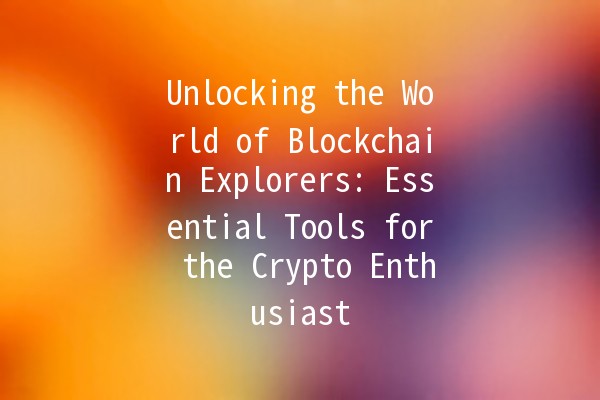
Blockchain explorers are invaluable tools in the world of cryptocurrency. They allow users to view and interact with the vast amounts of data stored on various blockchains, providing insights into transactions, wallet balances, and much more. In this article, we will explore what blockchain explorers are, how they work, and five productivityenhancing tips for using them effectively.
What is a Blockchain Explorer?
A blockchain explorer is a webbased tool that allows users to view information stored on a blockchain. It provides a userfriendly interface to search for transactions, addresses, and blocks. Each blockchain has its own unique explorer tailored to its specific functionalities.
For example, Bitcoin has explorers like Blockchair or Blockstream, while Ethereum has Etherscan. These explorers not only display transaction histories but also facilitate monitoring wallet balances and gas fees, making them essential for both casual users and serious investors.
The Importance of Blockchain Explorers
Blockchain explorers play a critical role in the cryptocurrency ecosystem for several reasons:

5 ProductivityEnhancing Tips for Using Blockchain Explorers
Most blockchain explorers offer advanced search capabilities that allow you to filter transactions by specific criteria, such as time, block number, or transaction ID. Utilizing these advanced search options can save time and provide more accurate results.
Example: If you want to check the transactions of a friend's wallet, instead of scrolling through endless transactions, enter their wallet address, and you’ll quickly find the information you need.
If you frequently check certain wallet addresses or monitor particular transactions, bookmarking these pages can streamline your workflow. Many explorers allow you to save your searches or create accounts for easy access to your mostused data.
Example: An investor might bookmark addresses of their favorite decentralized finance (DeFi) projects to keep an eye on transaction activities without repeated searches.
Many blockchain explorers now offer notification features. By setting up alerts for specific transactions or wallet addresses, you can stay informed of any changes without having to constantly check the explorer. This feature is vital for trading and investment activities.
Example: A trader might want to receive an alert if a certain wallet executes a large transaction, indicating a potential market move.
Understanding past transactions can provide insights into market trends. Blockchain explorers often allow users to access historical data. Analyze transaction histories to make informed decisions about your own trades or investments.
Example: By studying the transaction patterns of a particular cryptocurrency, you might identify an optimal price point to buy or sell based on historical support and resistance levels.
Understanding gas fees or transaction fees is crucial for optimizing the timing of your transactions. Use the fee estimation tools available in many explorers to determine the best time to execute transactions based on network congestion.
Example: Before making a significant transfer, an investor might examine the average gas fees over the past few hours and choose a time when fees are lower to maximize their returns.
Frequently Asked Questions (FAQs)
Block explorers are essential for the transparency and verification of cryptocurrency transactions. They allow users to track transactions in realtime, monitor wallet balances, and ensure that transactions have been confirmed on the blockchain, fostering trust in digital currencies.
To find your transaction, simply visit the appropriate blockchain explorer for the cryptocurrency you are using. Enter your wallet address or transaction ID in the search bar, and the explorer will display your transaction details, including its status and confirmations.
Generally, blockchain explorers are safe as they do not require sensitive information like private keys or passwords. However, always ensure you are using reputable explorers to avoid phishing sites or scams.
Yes, there are many multichain explorers available that provide information for various cryptocurrencies and their respective blockchains. However, most explorers are specific to one blockchain, so it is best to look for the explorer dedicated to the cryptocurrency you are interested in.
If your transaction is not appearing, it may be due to network congestion, or it might not have been processed yet. Ensure you’ve entered the correct wallet address or transaction ID, and check for updates on the network’s status.
A transaction becomes confirmed once it has been included in a block that is added to the blockchain. The number of confirmations can indicate the level of security for the transaction, as more confirmations mean that the transaction is deeply embedded in the blockchain.
The Future of Blockchain Explorers
As the cryptocurrency landscape continues to evolve, so will the functionality and capabilities of blockchain explorers. Future enhancements may include more sophisticated analytical tools, realtime alerts, and even integration with decentralized applications (dApps) for seamless usability. Enhanced user interfaces and AIdriven insights could also emerge, further streamlining users' interactions with blockchain data.
By embracing blockchain explorers, users can demystify the world of cryptocurrency, empowering themselves with the knowledge needed to navigate the digital financial landscape efficiently. Leveraging the tips and best practices outlined in this article will transform your explorations of the blockchain into a more productive and meaningful experience, ultimately enhancing your cryptocurrency journey.
Unlock the potential of blockchain explorers today and take your crypto experience to greater heights!

